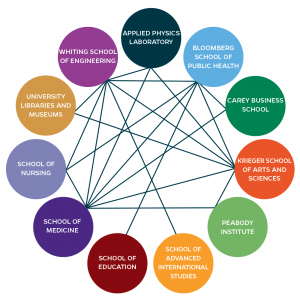
In 2018, 30 Discovery Awards were given to interdisciplinary faculty teams across eight Johns Hopkins divisions. From harnessing big data and machine learning to develop tools for autism risk prediction and intervention to understanding the neural computations underlying our sense of direction to studies on lead exposure and educational outcomes, these Discovery Awards are bridging the university to solve significant problems and spark new creative endeavors.
Altogether, the winning project teams—chosen from 190 proposals—include 108 individuals representing 11 Johns Hopkins entities. Notably, the partnerships engage the University Libraries and Museums for the first time in the program’s four award cycles. They are joined this year by all 10 university divisions.
A Computational Psychiatry Approach to Investigate Effort Valuation in Major Depressive Disorder – Fernando Goes (Medicine), Vikram Chib (Medicine) & Peter Zandi (Public Health)
A Dynamical Systems Approach to Understanding the Neural Computations Underlying our Sense of Direction – Kathleen Cullen (Medicine), James Knierim (Arts & Sciences) & Kechen Zhang (Medicine)
A Mobile Directly Observed Therapy Smartphone App for Immunosuppression Adherence in Transplant Patients– Macey Henderson (Medicine), Mara DeMarco McAdams (Public Health), Daniel Brennan (Medicine), Andrew Cameron (Medicine), Cozumel Pruette (Medicine) & Mario Macis (Business)
An Inventory of Methane Emissions from Natural Gas Infrastructure – Scot Miller (Engineering) & Sarah Jordaan (Advanced International Studies)
Automated Breast Cancer Screening on Digital Breast Tomosynthesis (3D Mammography) Using Deep Learning Systems – Susan Harvey (Medicine), Lisa Mullen (Medicine) & Gregory Hager (Engineering)
Averting an Autonomous Vehicle Winter – Johnathon Ehsani (Public Health), Tak Igusa (Engineering), Tamas Budavari (Engineering), Jon Vernick (Public Health) & Lingxin Hao (Arts & Sciences)
Development and Characterization of a Novel, Statin-Mediated Approach to Overcome Immune Suppression in Prostate Cancer – Fan Pan (Medicine), Elizabeth Platz (Public Health), Michael Marrone (Public Health) & Jun Liu (Medicine)
Development of a Focused Microwave NeuroAblation System – William Anderson (Medicine), Pawel Kudela (Medicine), Ra’id Awadallah (Applied Physics Lab) & Jacob Alldredge (Applied Physics Lab)
Digital Methylation Assessment for Early Noninvasive Detection of Ovarian Cancer – Tian-Li Wang (Medicine), Thomas Pisanic (Engineering), Ie-Ming Shih (Medicine) & Jeff Tza-Huei Wang (Engineering)
e-CHEC-uP: Scaling Up an Efficacious Cancer Screening Intervention for Women with Limited English Proficiency – Hae-Ra Han (Nursing), Paul Nagy (Medicine), Alain Labrique (Public Health) & Nancy Perrin (Nursing)
Electrophysiological Diagnostic and Prognostic Assessments for Concussion – Clara Scholl (Applied Physics Lab), Amanda Lauer (Medicine) & Vassilis Koliatsos (Medicine)
Elucidating the Mechanism of Nucleosome Disruption by a Pioneer Transcription Factor – Carl Wu (Arts & Sciences), Greg Bowman (Arts & Sciences) & Taekjip Ha (Medicine)
Engineered IGF-1 Nanoparticles to Improve Functional Recovery from Peripheral Nerve Injury – Sami Tuffaha (Medicine) & Hai-Quan Mao (Engineering)
Exotic Superconductors by Design – Jonah Erlebacher (Engineering) & Tyrel McQueen (Arts & Sciences)
Harnessing Big Data and Machine Learning to Develop Tools for Autism Risk Prediction and Intervention – Xiaobin Wang (Public Health), Nilanjan Chatterjee (Public Health), Christopher Chute (Medicine), Margaret Daniele Fallin (Public Health), Tina Cheng (Public Health) & Tak Igusa (Engineering)
Health System Interventions to Reduce Racial/Ethnic Disparities in Hypertension Control: How Do They Work? – John Jackson (Public Health) & Lisa Cooper (Medicine)
Improving Disease Gene Discovery Rate with Long-Read Nanopore Sequencing – Nara Lygia Sobreira (Medicine), Christopher Bradburne (Applied Physics Lab), Michael Schatz (Engineering) & David Valle (Medicine)
Improving Early Child Development Through the Integration of Safe Play and Song-Based Learning – Elli Leontsini (Public Heath) & Kelly Fisher (Arts & Sciences)
In Search of the Cosmic Dark Sector – Marc Kamionkowski (Arts & Sciences) & Robert Schaefer (Applied Physics Lab)
Lead Exposure and Educational Outcomes: A Population Study – Jeffrey Grigg (Education), Heather Volk (Public Health), Rashelle Musci (Public Health) & Faith Connolly (Education)
Life Without a Dentate Gyrus: A New Mouse Model to Dissect Hippocampal Structure and Function – James Knierim (Arts & Sciences), Jeremy Nathans (Medicine) & Mikhail Pletnikov (Medicine)
Nerve: from Aristotle to Ramon y Cajal – Thomas Brushart (Medicine), Norman Barker (Medicine), Christopher Cannon (Arts & Sciences), Christine Ruggere (Medicine), Corinne Sandone (Medicine) & Gary Lees (Medicine)
Novel Methods for Non-Invasive Assessment of Myocardial Fibrosis Complexity and Disorganization to Predict Ventricular Arrhythmias – Jonathan Chrispin (Medicine), Katherine Wu (Medicine), Mauro Maggioni (Engineering), Steven Jones (Medicine), David Okada (Medicine) & Natalia Trayanova (Engineering)
Overcoming the Block to Auditory Hair Cell Regeneration in Mammals – Ulrich Mueller (Medicine) & Cynthia Moss (Arts & Sciences)
Photoacoustic Image Guidance of Gynecological Surgeries – Muyinatu Bell (Engineering) & Karen Wang (Medicine)
Step Into My Brain: Experiencing Depressive Brain with Virtual Reality – Serap Bastepe-Gray (Peabody), Lucy Bucknell (Arts & Sciences), Haris Sair (Medicine) & Annette Porter (Arts & Sciences)
Syphilis Phylogenetic Study (SPS): Analysis of Syphilis within the Context of a Novel Network Analysis of Men at Risk of Infection: Towards a Deeper Understanding of the Epidemiology of the Syphilis Epidemic in Baltimore – Matthew Hamill (Medicine), Khalil Ghanem (Medicine), Anne Rompalo (Medicine), Jacky Jennings (Medicine), M. Kate Grabowski (Public Health) & Carl Latkin (Public Health)
Targeting Collective Invasion in Pancreatic Ductal Adenocarcinoma – Laura Wood (Medicine) & Joel Bader (Engineering)
Ultrasound Imaging of Voltage Membrane Abnormality: A Potential Prostate Cancer Detection Technology – Emad Boctor (Medicine), Zaver Bhujwalla (Medicine), Maged Harraz (Medicine), Ralph Etienne-Cummings (Engineering) & Martin Pomper (Medicine)
Uncovering Forbidden Fruit – Patricia McGuiggan (Engineering), Tamas Budavari (Engineering), Jennifer Jarvis (Libraries), Andrea Hall (Libraries) & Alex Szalay (Arts & Sciences)
Vice Provost for Research
265 Garland Hall
3400 North Charles Street
Baltimore, MD 21218
(443) 927-1957
